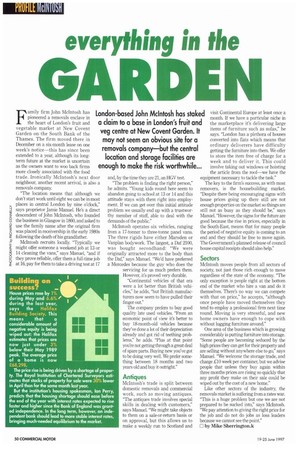everything in the GARDEN
Page 52

Page 53

If you've noticed an error in this article please click here to report it so we can fix it.
London-based John McIntosh has staked a claim to a base in London's fruit and veg centre at New Covent Garden. It may not seem an obvious site for a removals company—but the central location and storage facilities are enough to make the risk worthwhile... Family firm John McIntosh has pioneered a removals enclave in the heart of London's fruit and vegetable market at New Covent Garden on the South Bank of the Thames. The firm moved there in December on a six-month lease on one week's notice—this has since been extended to a year, although its longterm future at the market is uncertain as the owners want to woo back firms more closely associated with the food trade. Ironically McIntosh's next door neighbour, another recent arrival, is also a removals company.
"The location means that although we don't start work until eight we can be in most places in central London by nine o'clock," says proprietor Jamie Manuel. He's a direct descendent of John McIntosh, who founded the business in Glasgow in 1860, and asked to use the family name after the original firm was placed in receivership in the early 1980s following the death of his grandfather.
McIntosh recruits locally. "Typically we might offer someone a weekend job at 13 or 14 cleaning the vans," says Manuel, "and if they prove reliable, offer them a full-time job at 16, pay for them to take a driving test at 17
and, by the time they are 21, an HGV test.
"The problem is finding the right person," he admits. "Young kids round here seem to abandon going to school at 13 or 14 and this attitude stays with them right into employment. If we can get over this initial attitude problem we usually end up with a trustworthy member of staff, able to deal with the demands of the public."
McIntosh operates six vehicles, ranging from a 17-tonner to three-tonne panel vans. The three rigids have either Marsden or Vanplan bodywork, The largest, a Daf 2100, was bought secondhand: "We were originally attracted more to the body than the Daf," says Manuel. "We'd have preferred a Mercedes because the guy who does the servicing for us much prefers them. However, it's proved very durable.
"Continental vehicles of that era were a lot better than British vehicles," he adds, "but British manufacturers now seem to have pulled their finger out" The company prefers to buy good quality late used vehicles. "From an economic point of view it's better to buy 18-month-old vehicles because they've done a lot of their depreciation already and got rid of teething problems," he adds. "Plus at that point you're not getting through a great deal of spare parts. Buying new you've got to be doing very well. We prefer something between 18 months and two years old and buy it outright."
Antiques
McIntosh's trade is split between domestic removals and commercial work, such as moving antiques. "The antiques trade involves special skills in dealing with customers," says Manuel. "We might take objects to them on a sale-or-return basis or on approval, but this allows us to make a weekly run to Scotland and visit Continental Europe at least once a month. If we have a particular niche in the marketplace it's delivering large items of furniture such as sofas," he says. "London has a plethora of houses converted into flats which means that ordinary deliverers have difficulty getting the furniture into them. We offer to store the item free of charge for a week and to deliver it. This could involve taking out windows or hoisting the article from the roof—we have the equipment necessary to tackle the task."
The key to the firm's success, as with most removers, is the housebuilding market. "Despite there being encouraging signs with house prices going up there still are not enough properties on the market so things are still not as busy as they should be," says Manuel. "However, the signs for the future are good because the rise in prices, especially in the South-Fast, means that for many people the period of negative equity is coming to an end and they should be free to move again. The Government's planned release of council house capital receipts should also help."
Sectors
McIntosh moves people from all sectors of society, not just those rich enough to move regardless of the state of the economy. "The only exception is people right at the bottom end of the market who hire a van and do it themselves. There's no way we can compete with that on price," he accepts, "although once people have moved themselves they tend to employ a professional firm next time round. Moving is very stressful, and new home owners have enough to cope with without lugging furniture around."
One area of the business which is growing considerably is putting furniture into storage. "Some people are becoming seduced by the high prices they can get for their property and are selling without anywhere else to go," says Manuel. "We welcome the storage trade, and charge £10 week per container, but we advise people that unless they buy again within three months prices are rising so quickly that any profit they make on their sale could be wiped out by the cost of a new home."
Like other sectors of the industry, the removals market is suffering from a rates war. "This is a huge problem but one we are not prepared to be sucked into," says McIntosh. "We pay attention to giving the right price for the job and do not do jobs as loss leaders because we cannot see the point."
El by Mike Sherrington.k
Building on success?
House prices rose by 1% during May and 6.6%, during the lust year, says the Halifax Building Society. This means that considerable amount of negative equity is being wiped out: the Halifax estimates that prices are now just under 3 below their May 1989 peak. The average price of a home is now £68,298.
The price rise is being driven by a shortage of property. The Royal Institution of Chartered Surveyors estimates that stocks of properly for sale were 30% lower in April than for the some month k:ist year. But the institution's housing spokesman, Ian Perry, predicts that the housing shortage should ease before the end of the year with interest rates expected to rise faster and higher since the Bank of England was granted independence. In the long term, however, an independent bank should lead to more stable interest rates, bringing much-needed equilibrium to the market.
FACTFILE: JOHN MCINTOSH BASED: New Covent Garden Market, South London. FOUNDED: 1860, Glasgow. CONTACT: Jamie Manuel, proprietor. FLEET: Six vehicles including a 17-tonne Leyland Daf 2100 box van with a 57m3 body; a 12.5tonne Bedford TK 12.60; a 7.5-tonne Leyland Dal 8.13 Roadrunner, and three panel vans. SPECIAL EQUIPMENT: Side-loading equipment capable of taking fork-lifted containers. SPECIALITY: Domestic and commercial removals. TURNOVER: Around Dim.






















































































































